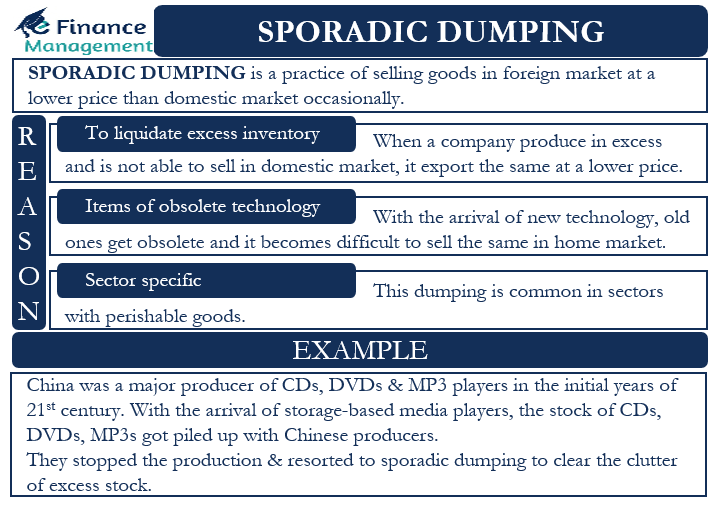Dumping is the commercial practice of selling goods abroad at a lower price than what the company sells in its own country. It is done to conquer new markets by eliminating competition and creating a monopoly. Sporadic dumping is the practice of occasional dumping. It means that the company does not sell its products regularly at dumping prices. This can be a short-term or temporary phenomenon. It is, therefore, not a permanent and long-term phenomenon. There are also other forms of dumping, such as reverse dumping, predatory dumping, and persistent dumping.
When a company adopts sporadic dumping, it begins to export its goods at a lower price than it demands on the domestic market. This means that it sells its products at a lower profit margin or sells at a price that covers only its marginal costs, or perhaps even at a loss. Unlike other forms of dumping, the main purpose of this type of dumping is not to eliminate competition in foreign markets. The aim is not to create a place or to conquer these markets permanently; this is a temporary or occasional strategy pursued by the company.
What are the reasons for adopting Sporadic Dumping?
There may be various reasons for sporadic dumping, some of which are:
To liquidate excess inventory
The liquidation of surplus /excess inventory is often the main cause of the adoption of a sporadic dumping strategy by the company. A company can build up an excess inventory of its goods over time and not be able to sell it on its domestic market. In such a case, it has two options – to lower the price of the product on the domestic market and sell more of it to liquidate its surplus inventory. Or it can export the surplus goods.
If it opts for the first option, it will destroy its own prices domestically. Ultimately, it will reduce its own profits in the long run. Therefore, it may not want to opt for this alternative. Suppose it chooses the other alternative of exporting its excess stocks. In that case, it may automatically have to go down the path of lowering the price of the product on the international market. It will give its products a competitive advantage in terms of prices, and it will help it gain some direct market share in foreign markets.
Items of obsolete technology
There may be cases where a company has brought new products or products with new technology to the domestic market. In such cases, it may have a stock of old products or those that work with the old technology. It may be difficult for the company to sell them on the domestic market and liquidate them, even at a discount.
In order to liquidate the old technologies or obsolete products, the company, therefore, has only the option of a sporadic dumping strategy. They can choose the dumping route to unload their obsolete inventory just for this time. This may not be a permanent feature. Therefore, they will lower the price of such products or even agree to sell them at a loss on foreign markets. This will help them to dissolve the inventory. It will also release their fixed financial and other valuable resources.
Sector-specific
Sporadic dumping is also often sector-specific and can be widespread in sectors dealing with perishable goods and commodities with limited shelf life. Such sectors can be agriculture, poultry, dairy products, etc. Due to the limited shelf life of such products and their perishability, companies may opt for sporadic dumping of such goods in order to make at least some money from it. If they do not dispose of their products, they may suffer a total loss. They may have to dispose of or destroy the products. They will end up making absolutely no money from them.
In addition, commodity industries generally go through a cycle of scarcity and build-up of overcapacity. In times of overcapacity, therefore, sporadic dumping is carried out in order to liquidate the additional production.
Also Read: Persistent Dumping

Example of Sporadic Dumping
Let us understand the strategy of sporadic dumping using the example of CD players. China was a major producer of CD, DVD, and MP3 players in the early years of the 21st century. With the advent of storage-based media players, demand for the old CD players and CDs, DVDs, and MP3 players plummeted. It left producers with the stock of unsold inventories.
They immediately stopped any new production of these players and the media. They resorted to sporadic dumping to eliminate and liquidate their unsold stocks. As a result, neighboring countries were flooded with these players and their media. The pricing was never-before-heard, of which the local producers could not even think of matching.
Conclusion
Sporadic dumping is not a permanent strategy pursued by countries and producers around the world. It is only needs-based and temporary. So countries need not worry about sporadic dumping and look for strict rules for this particular form of dumping.
In some cases, the country or the producer involved in sporadic dumping may actually find the opportunity very lucrative and profitable. It may start to find ways to establish its place abroad permanently and find strategic ways to eliminate foreign competition. Then, sporadic dumping will begin to turn into other forms of dumping. In such cases, the importing country should start to worry and introduce rules to combat and eliminate this dumping.

